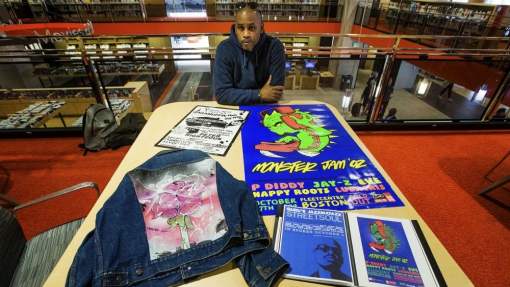What is Participatory Archiving?
“Being able to have your picture taken with whatever you're bringing, tell a story. . . and have it scanned is one of the most appealing aspects of the project. . . . This is our legacy and we're given the opportunity to tell it in our own words. How often does that happen?”
— Rob Stull, hip-hop artist and collector

Rob Stull, contributor to the Mass. Memories Road Show: The Hip-Hop Edition event, from The ARTery (WBUR). Photograph by Joanne Costa for WBUR.
Public digitization events are part of an emerging phenomenon that archival theorists refer to as participatory archiving. At these events--commonly called “scanning days” or “digitization days”--individuals connected with a theme, topic, event, or community come together to share personal and family photographs and stories to have them copied and then added to a digital collection.
Participatory archive projects are community-based, but distinct from community archives which are created and maintained independently outside of a traditional and institutionally based archive. With participatory archiving, professional archivists and librarians mediate and facilitate a process for community members to play active roles in selecting and describing photographs, documents, objects, or other items to be preserved in a collection and made accessible by an established institutional repository.
Collaborative Practice
Participatory archiving is a form of collaborative practice in which archivists, historians, and community members work together to document local and community histories and build unique archival collections. By inviting community members to add their stories and perspectives to the historical record at participatory archiving events, archivists and historians are committed to sharing authority with the public. Professional archivists recognize that they are not the sole experts in the distribution, presentation, and retrieval of information. Academically-trained historians acknowledge that including the perspectives of ordinary people helps to break down hierarchies and create richer portraits of local, regional, and national histories.
History
In the United States, archivists and public historians began organizing these types of initiatives in the mid-2000s using new digitization technologies and web-based tools that made it possible and affordable to copy personal materials such as family photo albums and scrapbooks and make them broadly available online. A number of independent initiatives--including the Mass. Memories Road Show at UMass Boston, My Maine Stories at the Maine Historical Society, History Harvests at the University of Nebraska-Lincoln, and Culture in Transit in New York City--emerged alongside one another almost simultaneously.
From 2015 to 2019, the National Endowment for the Humanities (NEH) played a catalyzing role through the Common Heritage grant program that supported approximately 100 community digitization and outreach projects “to increase public awareness and stewardship of heritage collections held by the public. American’s cultural heritage is preserved not only in libraries, museums, archives, and other community organizations, but also in all of our homes, family histories, and life stories.” Like this NEH program, participatory archiving events seek to capture this vital dimension of our country’s heritage and preserve it for future generations.
RoPA (Roadmap for Participatory Archiving)
RoPA (Roadmap for Participatory Archiving) brings together the best practices in event-based participatory archiving that librarians, archivists, public historians, and community members have learned through experience of the past couple of decades. We hope that libraries and communities will use RoPA to build on this growing collective body of knowledge and to document the cultural heritage of individuals and groups currently underrepresented in their local collections.
Together, and with RoPA, we can work toward building a more inclusive archival record and understanding of the shared histories of all Americans.
For further reading (available from your local library or through the links provided below):
- Edward Benoit, III. & Alexandra Eveleigh, (Eds.) Participatory Archives: Theory & Practice (London: Facet Publishing, 2019).
- Jesse Johnston, "Common Heritage Update: NEH Continues Support for Community Archives in 2018." National Endowment for the Humanities website, December 14, 2017.
- Ana Roeschley and Jeonghyun Kim, “‘Something that feels like a community’: The role of personal stories in building community-based participatory archives.” Archival Science, March 2019 19:1: 27-49.
- Eddie Woodward, “Participatory archiving: the next generation in archival methodology,” College and Research Libraries News 77:8, September 2016.